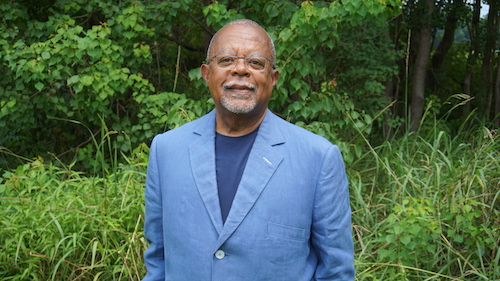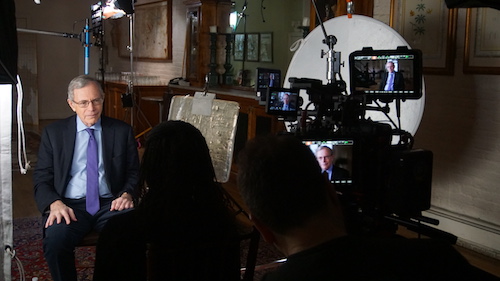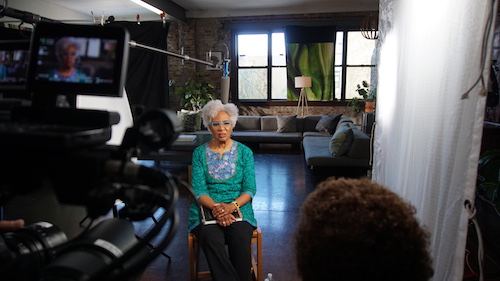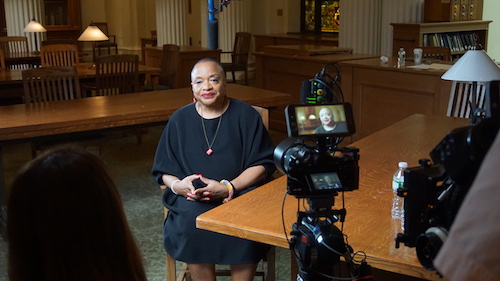Communiqué
Special Broadcast of “Reconstruction: America After The Civil War,” July 4 from 4pm-8pm
< < Back toRECONSTRUCTION: AMERICA AFTER THE CIVIL WAR,
Henry Louis Gates, Jr. Documentary,
Encore Presentation July 4th from 4 to 8 pm
— Four-Hour Film Explores the United States’ Emergence from the Civil War and Slavery, and the Era’s Thwarted Vision for an Interracial Democracy
That Haunts the Country More Than 150 Years Later —

RECONSTRUCTION: AMERICA AFTER THE CIVIL WAR, a four-hour documentary executive produced and hosted by Henry Louis Gates, Jr., will air Saturday, July 4th on WOUB. Professor Gates, the Alphonse Fletcher University Professor at Harvard University and director of the Hutchins Center for African and African American Research, presents the definitive history of one of the least understood chapters in American history — the transformative years following the American Civil War, when the nation struggled to rebuild itself in the face of profound loss, massive destruction and revolutionary social change. The documentary is a production of McGee Media, Inkwell Films and WETA Washington, DC.
“Reconstruction is one of the most important and consequential chapters in American history,” said Gates. “It is also among the most overlooked, misunderstood and misrepresented. Our film will tell the real story of Reconstruction, honoring the struggle of the African Americans who fought their way out of slavery and challenged the nation to live up to the founding ideals of democracy, freedom and equality. But we will also tell the tragic story of the sustained and often violent pushback against Reconstruction’s determination to secure equal rights for black people, and the subsequent rise of white supremacy leading to the implementation of Jim Crow segregation. More than 150 years later, this struggle continues.”

“RECONSTRUCTION: AMERICA AFTER THE CIVIL WAR continues a very important conversation about race in America today, and the history that brought us here. Henry Louis Gates, Jr. weaves this story together in a compelling narrative that brings a sense of urgency to understanding our national story,” said Rockefeller. “We are thrilled to present this documentary to public television audiences and look forward to the dialogue it invites.”
RECONSTRUCTION: AMERICA AFTER THE CIVIL WAR includes interviews from leading historians, authors and other experts, including:
• David W. Blight, Ph.D., author and Class of 1954 Professor of American History, and Director, Gilder Lehrman Center, Yale University:
• Congressman James E. Clyburn, U.S. House of Representatives, South Carolina 6th District;
• Jelani Cobb, a staff writer for The New Yorker and The Ira A. Lipman Professor of Journalism, Columbia University;
• Kimberlé W. Crenshaw, an American civil rights advocate and Professor of Law, Columbia Law School, and Distinguished Professor of Law, UCLA School of Law
• Eric Foner, Ph.D., the DeWitt Clinton Professor of History, Columbia University, and author of Reconstruction: America’s Unfinished Revolution;
• Edna Greene Medford, author, and Professor and Former Chair, Department of History, Howard University;
• Mitch Landrieu, the former Mayor of New Orleans;
• and Bryan Stevenson, the founder and executive director of the Equal Justice Initiative, the nonprofit legal advocacy group that created the National Memorial for Peace & Justice in Montgomery, AL.

The film takes a broad view of the Reconstruction era and its aftermath, beginning with the hopeful moment of war’s end and emancipation in 1865, and carrying through to 1915, when the nation was fully entrenched in Jim Crow segregation. In the aftermath of the Civil War, the nation was devastated by death and destruction. Members of the U.S. Congress endeavored to reunite North and South while granting citizenship rights to newly freed African Americans. Millions of former slaves and free black people sought out their rightful place as equal citizens under the law. The dream of an interracial democracy was brief, and the broken promises of the Reconstruction era haunt the country to this day. Though tragically short-lived, this bold democratic experiment was, in the words of W. E. B. Du Bois, a “brief moment in the sun” for African Americans, when they could advance and achieve education, exercise their right to vote, and run for and win public office.
The first half of the documentary centers on the pivotal decade following the Civil War rebellion, charting black progress and highlighting the accomplishments of the many political leaders who emerged to usher their communities into this new era of freedom. The series’ second half looks beyond that hopeful decade, when the arc of history bent backwards. Tracing the unraveling of Reconstruction and the rise of Jim Crow segregation in the closing years of the 19th century, the film also look at the myriad ways in which black people continued to acquire land, build institutions and strengthen communities amidst increasing racial violence and repression.
The film also explores the flowering of African American art, music, literature and culture as tools of resistance in the struggle against Jim Crow racism, and the surge of political activism that marked the launch of iconic civil rights organizations.

PART ONE (4PM – 6PM)
HOUR ONE: The aftermath of the Civil War was exhilarating and fraught, hopeful and violent. Four million newly freed African Americans faced the future untethered from the old plantation system, with few rights or protections, and surrounded by a war-weary and intensely resistant white population. Within a few months of war’s end, President Andrew Johnson’s lenient treatment of former Confederates incited a powerful response among Northerners, especially the Republicans in Congress. The result was tantamount to a second American revolution, in which former slaves and their allies forged new meanings of freedom and citizenship. In the first presidential election after the Civil War, African American men voting for the first time in the South helped send Republican war hero Ulysses S. Grant to the White House.
HOUR TWO: Post-Civil War America was a new world. For African Americans living in the former Confederacy, now for the first time with citizenship and voting rights, they could begin to take charge of their own lives, families and communities. The first black men took seats in the U.S. Congress, in Southern state governments and on juries; black colleges opened and the Southern states’ first public school systems were organized; newly created black institutions flourished; and black families began buying land to farm and opened businesses to achieve a measure of independence from their former masters. But the progress did not last long. White reactionaries in the former Confederacy launched violent attacks to “redeem” their states, to re-establish the old order — a society built on white supremacy. Northern support for Reconstruction and military intervention in the South eventually faded, particularly with an economic depression in 1873. By the 1876 Presidential election, both leading candidates — Democrat and Republican — pledged to bring an end to Reconstruction.
PART TWO (6PM – 8PM)
HOUR THREE: The years 1877-1896 were a transitional period that saw visions of a “New South” set the stage for the rise of Jim Crow and the undermining of Reconstruction’s legal and political legacy. With cotton still king in the South, sharecropping became the dominant economic fate for many black farmers, while convict leasing echoed slavery in new and harrowing ways. In 1883, the U.S. Supreme Court gutted the Civil Rights Act of 1875, making it legal for business owners to refuse to serve black patrons. In response to being denied access to public spaces, many African Americans created their own businesses and recreational spaces in the segregated South and other parts of the county. These “safe havens” could not protect from the growing onslaught of violence and lynching. Fredrick Douglass and Ida B. Wells were among the many key figures who wrote about the ills of lynching. Others like Isaiah Montgomery and Booker T. Washington took a more accommodationist approach to tackling injustice. Throughout this hour, African Americans continue to exercise agency over their lives, circumventing attacks and challenges as Jim Crow encroaches and Plessy v. Ferguson takes center stage at the U.S. Supreme Court, where “separate but equal” would become the law of the land.

HOUR FOUR: The turn of the 19th century to the 20th is known as the “nadir” of race relations in America, a period in which white supremacy held sway and racial violence spread across the South. Thirty years after the end of the Civil War, North and South had gone a long way toward reconciling under an American identity that cropped out black people and ignored their claims to the rights of citizenship under the Constitution. Reconstruction became a distant memory, and white supremacist propaganda began to change the story of the Civil War and its aftermath, glorifying the fallen heroes of the Confederacy and painting Reconstruction as a tragic mistake.
Popular culture was devastatingly effective in propagating racist tropes in this era; from soap advertisements to minstrel shows, a flood of offensive imagery denied the humanity of African Americans. But even facing both physical and psychological oppression, African Americans found ways to fight back. With photography, theater, music and writing, they began to put forward their vision of a “New Negro” for a new century.
With RECONSTRUCTION: AMERICA AFTER THE CIVIL WAR, Gates continues a tradition of producing sophisticated documentary films about the African and African American experience for a broad audience, including the Emmy Award-winning documentary THE AFRICAN AMERICANS: MANY RIVERS TO CROSS, as well as the documentaries AFRICAN AMERICAN LIVES and BLACK AMERICA SINCE MLK: AND STILL I RISE.

